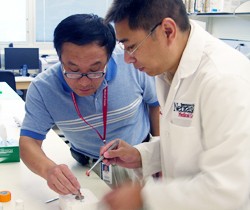 Yulong Li, M.D., Ph.D., assistant professor in the UNMC Department of Emergency Medicine, recently received a four-year, $1.5 million grant from the National Heart, Lung and Blood Institute to study the role of the nervous system in heart failure.
Yulong Li, M.D., Ph.D., assistant professor in the UNMC Department of Emergency Medicine, recently received a four-year, $1.5 million grant from the National Heart, Lung and Blood Institute to study the role of the nervous system in heart failure.
 |
Yulong Li, M.D., Ph.D., left, and Huiyin Tu, Ph.D., post-doctoral fellow, prepare a sample for their research. |
In the United States, an estimated 300,000 people die from heart failure and 660,000 new cases are diagnosed each year.
Below Dr. Li discusses his research.
|
Our team evaluates baroreflex dysfunction in the nervous system of rodent models to find out why the aortic baroreceptor neuron the neck sends signals to the brain, which affects the heart. Studies have confirmed a contribution of arterial baroreflex impairment in heart failure. However, the mechanisms of what’s called baroreflex dysfunction remain unclear.
What is the goal of your research?
We want to find out why the nervous system controls the heart and makes it excited and start beating faster. If there is nervous system dysfunction, the heart function has trouble. Though not everyone with heart failure starts out with nervous system trouble, heart failure ultimately affects all patients’ nervous systems. The ultimate goal is to find a new therapy for heart failure.